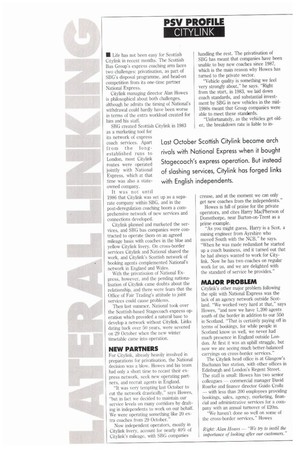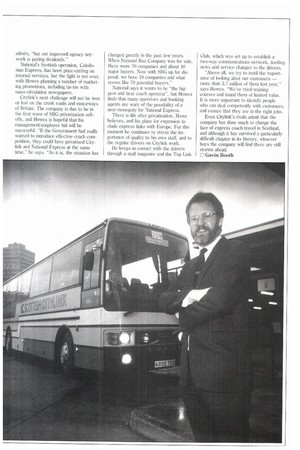PSV PROFILE CITY LINK
Page 56

Page 57

If you've noticed an error in this article please click here to report it so we can fix it.
MI Life has not been easy for Scottish Citylink in recent months. The Scottish Bus Group's express coaching arm faces two challenges: privatisation, as part of SBG's disposal programme, and head-on competition from its one-time partner National Express.
Citylink managing director Alan Howes is philosophical about both challenges, although he admits the timing of National's withdrawal could hardly have been worse in terms of the extra workload created for him and his staff.
SBG created Scottish Citylink in 1983 as a marketing tool for its network of express coach services. Apart from the longestablished runs to London, most Citylink routes were operated jointly with National Express, which at that time was also a stateowned company.
It was not until 1986 that Citylink was set up as a separate company within SBG, and in the post-deregulation coaching boom a comprehensive network of new services and connections developed.
Citylink planned and marketed the services, and SBG bus companies were contracted to operate them on an agreed mileage basis with coaches in the blue and yellow Citylink livery. On cross-border services Citylink and National shared the work, and Citylink's Scottish network of booking agents complemented National's network in England and Wales.
With the privatisaion of National Express, however, and the pending nationalisation of Citylink came doubts about the relationship, and there were fears that the Office of Fair Trading's attitude to joint services could cause problems.
Then last summer, National took over the Scottish-based Stagecoach express operation which provided a natural base to develop a network without Citylink. Links dating back over 50 years. were severed on 29 October when the new winter timetable came into operation.
For Citylink, already heavily involved in preparations for privatisation, the National decision was a blow. Howes and his team had only a short time to recast their express network, seek new operating partners, and recruit agents in England.
"It was very tempting last October to cut the network drastically," says Howes, "but in fact we decided to maintain our service levels on many corridors by drafting in independents to work on our behalf. We were operating something like 20 extra coaches from 29 October."
Now independent operators, mostly in Citylink livery, account for nearly 40% of Citylink's mileage, with SBG companies handling the rest. The privatisation of SBG has meant that companies have been unable to buy new coaches since 1987, which is the main reason why Howes has turned to the private sector.
"Vehicle quality is something we feel very strongly about," he says. "Right from the start, in 1983, we laid down coach standards, and substantial investment by SBG in new vehicles in the mid1980s meant that Group companies were able to meet these standerds.
"Unfortunately, as the vehicles get older, the breakdown rate is liable to in crease, and at the moment we can only get new coaches from the independents."
Howes is full of praise for the private operators, and cites Harry MacPherson of Domsthorpe, near Burton-on-Trent as a prime example.
"As you might guess, Harry is a Scot, a mining engineer from Ayrshire who moved South with the NCB," he says. "When he was made redundant he started up a coach business, and it turned out that he had always wanted to work for Citylink. Now he has two coaches on regular work for us, and we are delighted with the standard of service he provides."
Citylink's other major problem following the split with National Express was the lack of an agency network outside Scotland. "We worked very hard at that," says Howes, "and now we have 1,200 agents south of the border in addition to our 550 in Scotland. "That is certainly paying off in terms of bookings, for while people in Scotland know us well, we never had much presence in England outside London. At first it was an uphill struggle, but now we are seeing much better-balanced carryings on cross-border services."
The City-link head office is at Glasgow's Buchanan bus station, with other offices in Edinburgh and London's Regent Street. The staff is small: Howes has two senior colleagues — commercial manager David Rourke and finance director Guido Crolla — with less than 200 employees providing bookings, sales, agency, marketing, financial and administrative services for a company with an annual turnover of £20m.
"We haven't done so well on some of the cross-border services," Howes admits, but our improved agency network is paying dividends."
National's Scottish operation, Caledonian Express, has been price-cutting on internal services, but the fight is not over, with Howes planning a number of marketing promotions, including tie-ins with mass-circulation newspapers.
Citylink's next challenge will not be won or lost on the trunk roads and motorways of Britain. The company is due to be in the first wave of SBG privatisation selloffs, and Howes is hopeful that his management/employee bid will be successful. "If the Government had really wanted to introduce effective coach competition, they could have privatised Citylink and National Express at the same Lime," he says. "As it is, the situation has changed greatly in the past few years. When National Bus Company was for sale, there were 70 companies and about 10 major buyers. Now with SBG up for disposal, we have 10 companies and what seems like 70 potential buyers."
National says it wants to be "the biggest and best coach operator", but Howes finds that many operators and booking agents are wary of the possibility of a near-monopoly for National Express.
There is life after privatisation, Howe believes, and his plans for expansion include express links with Europe. For the moment he continues to stress the importance of quality to his own staff, and to the regular drivers on Cityhnk work.
He keeps in contact with the drivers through a staff magazine and the Top Link Club, which was set up to establish a two-way communications network, feeding news and service changes to the drivers.
"Above all, we try to instil the importance of looking after our customers — more than 3.7 million of them last year," says Howes. "We've tried training courses and found them of limited value. It is more important to identify people who can deal competently with customers, and ensure that they are in the right jobs.
Even Citylink's rivals admit that the company has done much to change the face of express coach travel in Scotland, and although it has survived a particularly difficult chapter in its history, whoever buys the company will find there are still storms ahead.
Gavin Booth








































































































































